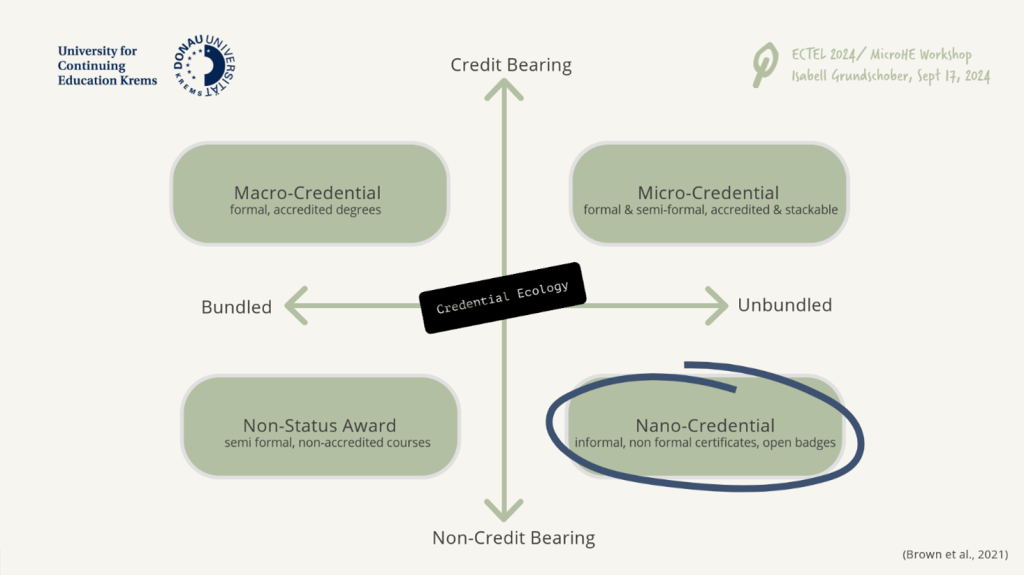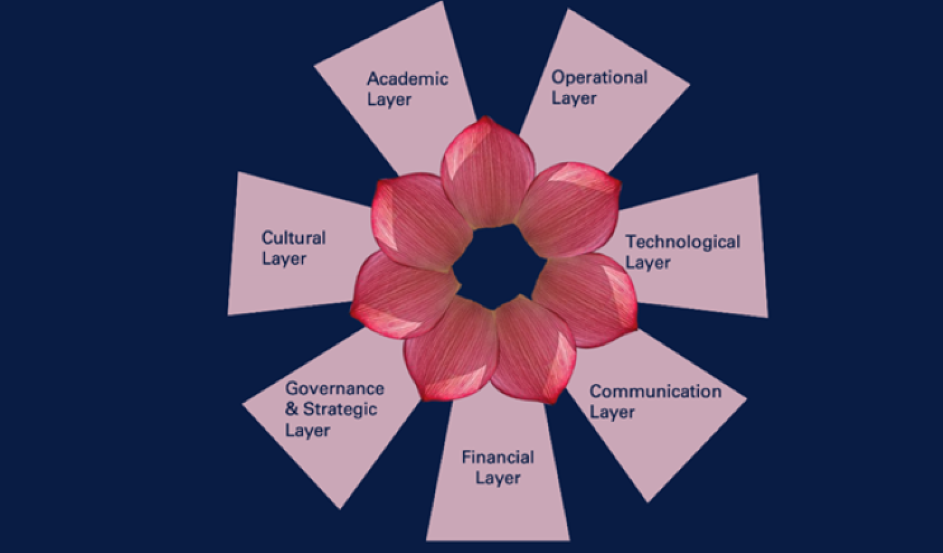Sosiaali- ja terveydenhuollon toimintaympäristö muuttuu nopeammin kuin koskaan. Erityisesti digitalisaatio, palvelurakenteiden uudistukset, väestön moninaistuminen ja tiedonvälityksen murros asettavat uusia vaatimuksia…
Tekijät | Authors

How to facilitate flexible and deep learning with micro-credentials
Micro-credentials can help learners set goals, build confidence and self-regulate learning. These bite-sized learning offers can also offer assistance in updating the skills of university lecturers and researchers. Micro-credentials are discussed in universities around the world, which leads to rethinking institutional strategies, policies and practices.

Picture 1: Attending the online and in-person in Krems, Austria.
What changes in the learning process when learning is split into more manageable chunks for learners? These chunks are called micro-credentials. Our experts organised a workshop as part of the international ECTEL conference in Krems, Austria, 17 September 2024. The workshop explored how to foster flexible and deep learning with micro-credentials and open badges in Higher and Continuing Education.
Universities invest a great deal in the development of this more granular educational offering. Also, the EU.ACE (European University for Academic Continuing Education) consortium emphasises Micro-credentials for several reasons. They make international and intercultural learning experiences more accessible and university partnerships can implement these smaller units more quickly, accelerating collaboration.
In the workshop, we identified challenges and discussed the forms of instruction and support needed to facilitate learner goal setting, self-efficacy and self-regulation in learning with micro-credentials and open badges. In addition, we explored the opportunities that emerge with a system of small educational modules, micro-credentials and well-defined profiles, with the aim of creating a meaningful stack of skills recognised by the labour market and society.
In the following, we will highlight the key insights and reflections from the workshop. Whether you work in the field of continuous and flexible learning or are simply interested in future learning needs and skill development, we hope our reflections will inspire you.
Learner motivation and engagement
Micro-credentials offer a flexible, targeted way to help people in developing knowledge, skills and competences needed for their personal and professional development (EU council, 2022). As learning affordance becomes increasingly modular, learners may come across an abundance of choices. Compared to studying larger parts of a degree programme or a degree, finding a cohesive learning path among these choices can be challenging.
When learning with micro-credentials, the responsibility of creating a personal learning journey transfers from the educators to the learners.
During our discussions, we found out that the concept of stackability — where learners choose to study several Micro-credentials — rarely happens without support from a tutor.
In educational research, the concept of self-regulation refers to learner’s beliefs about their ability to engage in appropriate actions, thoughts, feelings and behaviours to pursue valuable academic goals (Baumeister et al., 2006). Learners with an optimistic attitude towards their learning monitor and control their learning process and apply diverse learning strategies (Virtanen et al., 2015). Thus, we explored how we can guide students towards making the right choice and how to nudge them in the right direction when navigating their learning paths.
Further research is needed to identify what kind of support is needed to assist learners in building personal learning paths using stackable micro-credentials.
In this vein, we should explore how to embed the development of self-regulation skills with the learning of content in micro-credentials.
The role of micro-credentials in updating the skills of university teachers and lecturers
Micro-credentials also play a promising role in engaging university staff members in professional development. Bite-sized learning is ideal for teachers who need to balance teaching tasks and other responsibilities.
At the University for Continuing Education Krems, learning modules are categorised as micro-credentials if they carry 3, 6, or 9 ECTS points. Additionally, the university offers smaller, more flexible learning units known as ”university seminars”, which typically carry fewer than 3 ECTS. These seminars are not necessarily integrated into a formal curriculum.
Within the broader credential ecosystem (Brown et al., 2021), these smaller learning units could be described as “nano-credentials,” reflecting their size and flexibility in comparison to traditional academic credentials. Nano-credentials are small, flexible learning units, designed to offer targeted, stackable pathways for upskilling.
These credentials are especially beneficial for working professionals, allowing them to enhance specific skills without committing to a full degree programme.
By fitting into a broader credential ecology (Brown et al., 2021), nano-credentials enable learners to blend formal and informal learning, boosting employability and providing validation across higher education (HE) and vocational education and training (VET).

Picture 2: Credential Ecology, edited from Brown et al., 2021
What should change on the institutional level?
The successful implementation of micro-credentials requires a comprehensive transformation across multiple layers of an institution. At the MicroHE workshop, we discussed a strategic framework for this change. We emphasised the importance of rethinking curricula, operational processes, and cultural mindsets. A central element of this transformation is the concept of stackability — enabling learners to accumulate micro-credentials that can lead to higher qualifications, such as diplomas or degrees.
We highlighted seven layers that are essential for institutional change: those which are academic, operational, technological, financial, communicational, governmental, and cultural. Each layer plays a vital role in supporting micro-credential programmes. For instance, standardising learning outcomes and credit systems ensures flexibility without sacrificing consistency.
Operational adjustments, such as streamlining enrollment processes and adapting academic calendars, further support the diverse needs of learners.
Moreover, integrating new technologies like Learning Management Systems (LMS) and digital badges allows for more personalised and scalable learning experiences. Financial sustainability can be achieved through accessible pricing models and industry partnerships. Finally, a culture that embraces innovation and supports faculty development is crucial for fostering a successful micro-credential ecosystem.
By addressing these interconnected layers, institutions can effectively implement micro-credentials, offering more flexible and accessible educational opportunities for today’s learners.

Picture 3: Seven layers of institutional transformation by Christina Hell.
Shaping the future of life-long learning with micro-credentials
Micro-credentials offer a promising pathway for lifelong, individualised learning, providing continuous development opportunities for learners of all ages. Micro-credentials limit study time, align with professional needs, and allow for the accumulation and recognition of smaller learning units. Compared to traditional degree programmes, they are more affordable and highly attractive to individuals seeking career-aligned education, as well as to companies with focused training needs.
Furthermore, micro-credentials foster interinstitutional and international collaboration, facilitating mutual recognition and validation of learning outcomes. However, building trust within diverse student groups over time poses a challenge, particularly regarding social dynamics and continuity.
To fully realise the benefits of micro-credentials, students must be supported in selecting appropriate learning paths, which could enhance the international recognition and portability of their education.
For educators, micro-credentials provide the opportunity to develop focused, modular curricula that are industry-relevant, interactive, and practice-oriented. These shorter programmes, such as nano-credentials, keep education adaptable to job market trends, boost employability and support the lifelong learning goals outlined in the Tirana Communiqué:
”Need for Lifelong learning in society is increasing, especially for all those requiring or desiring new competences to enhance their professional, personal or civic potential. Learning paths need to be flexible, properly delivered, quality assured, and recognised.”
Despite their potential, universities face many challenges in implementing micro-credentials. Faculty might need training or coaching to create relevant content and restructure existing programmes into manageable units. Standardisation (e.g., 3 or 5 ECTS credits) is key to ensuring the stackability of these credentials. The workshop highlighted the importance of a strategic, collaborative change process, with pilot projects recommended to refine micro-credential offerings and to implement them into the university strategy. Additionally, targeted communication for students, companies, and the public needs to be developed.
Teachers as learners and teachers are the providers of micro-credentials with its challenges. The EU.ACE consortium aims to ensure that academics are able to take charge of this development by fostering opportunities to share experiences, pilot, and research the outcomes.
Micro-credentials can make an excellent contribution to upskilling activities for teachers and lecturers. Staff training also ties in with the institutional anchoring measures of micro credentials. In the context of internationalisation, micro-credentials are particularly well suited to cover short-term mobility and internationalisation at a distance.
Literature
- Baumeister, R. F., Gailliot, M., DeWall, C. N., & Oaten, M. (2006). Self-regulation and personality: How interventions increase regulatory success, and how depletion moderates the effects of traits on behavior. Journal of Personality, 74, 1773–1801.
- Brown, M., Mhichíl, M. N. G., Beirne, E., & Lochlainn, C. M. (2021). The Global Micro-credential Landscape: Charting a New Credential Ecology for Lifelong Learning. Journal of Learning for Development, 8(2), Article 2. https://doi.org/10.56059/jl4d.v8i2.525
- EHEA Tirana Communiqué 2024. Retrieved 29 October 2024 at https://ehea2024tirane.al/wp-content/uploads/2024/06/Tirana-Communique.pdf
- Council Recommendation of 16 June 2022 on a European approach to micro-credentials for lifelong learning and employability (OJ C 243, 27.6.2022, pp. 10–25).
- Virtanen, P., Nevgi, A. & Niemi, H. (2015). Self-regulation in higher education: Students’ motivational, regulational and learning strategies, and their relationships to study success. Studies for the learning society, vol. 3, no. 1-2, pp. 20-36. https://doi.org/10.2478/sls-2013-0004
Article picture: Adobe Firefly









Rahoitusmalli ei kannusta korkeakouluja semiformaalien ja informaalien koulutusten tuottamiseen. Sen vuoksi pääpaino on puhtaasti formaaleissa koulutuksissa. Toki täydennyskoulutuksena voidaan tarjota non-formaalin koulutuksen lisäksi formaalia koulutusta. Eihän enää lanseerata käyttöön uutta termiä, semiformaali:)
Annin voisi tiivistää siihen, että mikrokredentaali on opintojakso, jonka laajuus on 5 op. Eli yksittäinen avoimen amkin opintojakso
Kiitos kommentistasi Katja. Artikkelissakin esiintyvien termien moninaisuus kuvastaa nykytilannetta ja sitä että eri maissa, eri korkeakouluissa ja kirjallisuudessa käytetään hieman erilaisia käsitteitä jatkuvaan oppimiseen liittyen. Työpaja, jonka tuotoksiin artikkeli pohjautuu, koostui eri maiden korkeakoulujen asiantuntijoiden alustuksista ja esimerkeistä sekä yhteisistä keskusteluista ja ryhmätöistä. Kukin meistä edistää jatkuvaa oppimista ja mikrokredentiaaleja tällä hetkellä hieman omalla tavallaan ja omilla termeillään. Onkin syytä lisätä kansainvälistä verkostovuoropuhelua ja yhteistyötä jatkossa kuten artikkelissakin todetaan. Yhteistyössä ja esimerkiksi terminologian selkeyttämisessä on paljon potentiaalia ja siitä hyötyvät kaikki, niin korkeakoulut, oppijat kuin työelämäkin. 🙂